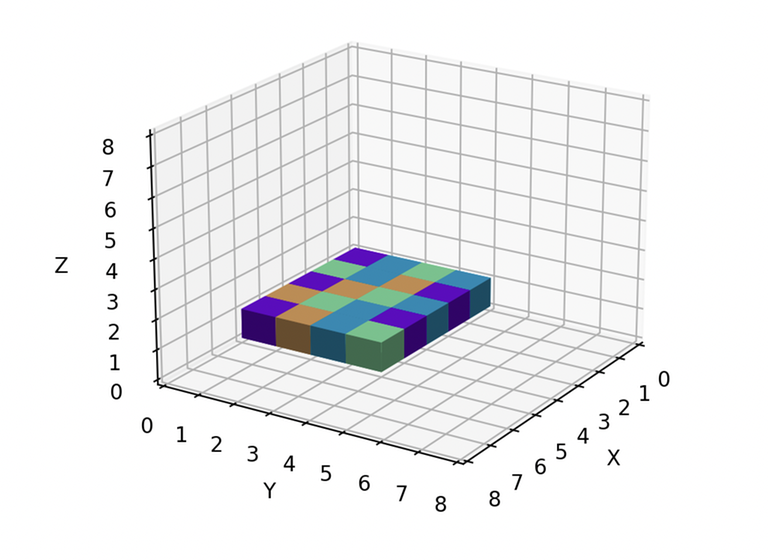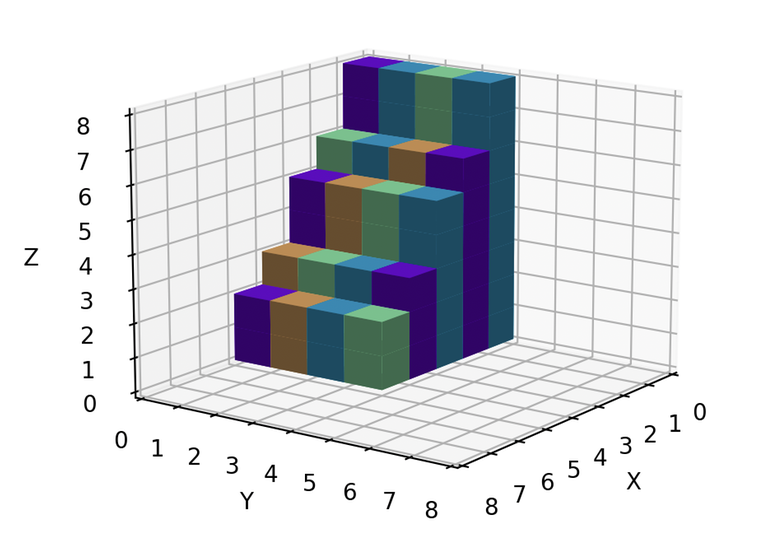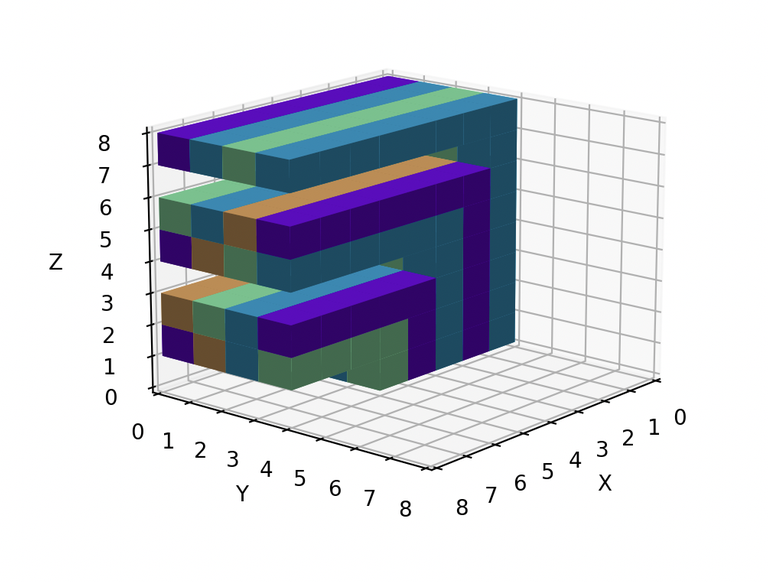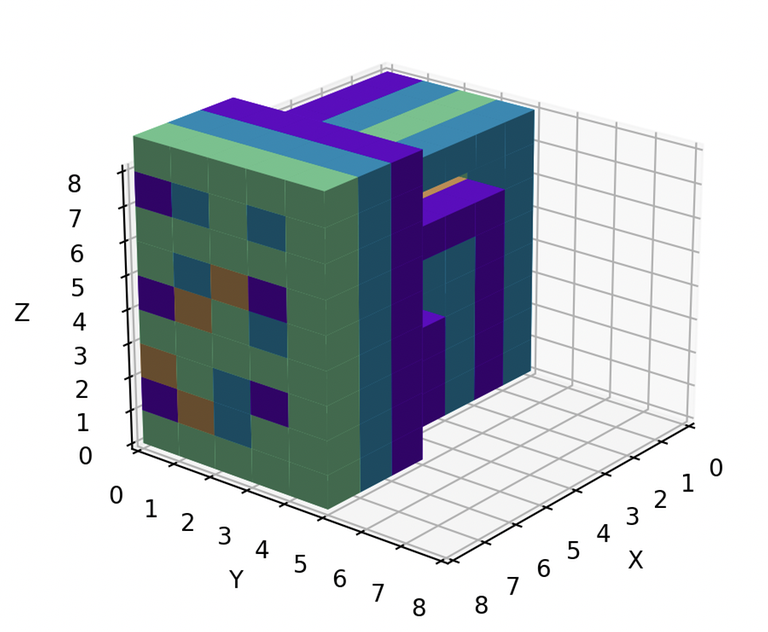



Code is available at https://mirror.codeforces.com/contest/1965/submission/258446500.
The maximum cost is 348800. I hope the reader is entertained.
| # | User | Rating |
|---|---|---|
| 1 | tourist | 3985 |
| 2 | jiangly | 3814 |
| 3 | jqdai0815 | 3682 |
| 4 | Benq | 3529 |
| 5 | orzdevinwang | 3526 |
| 6 | ksun48 | 3517 |
| 7 | Radewoosh | 3410 |
| 8 | hos.lyric | 3399 |
| 9 | ecnerwala | 3392 |
| 9 | Um_nik | 3392 |
| # | User | Contrib. |
|---|---|---|
| 1 | cry | 169 |
| 2 | maomao90 | 162 |
| 2 | Um_nik | 162 |
| 4 | atcoder_official | 161 |
| 5 | djm03178 | 158 |
| 6 | -is-this-fft- | 157 |
| 7 | adamant | 155 |
| 8 | awoo | 154 |
| 8 | Dominater069 | 154 |
| 10 | luogu_official | 150 |




Code is available at https://mirror.codeforces.com/contest/1965/submission/258446500.
The maximum cost is 348800. I hope the reader is entertained.
After 33 months of no Codeforces, I've finally did another round today.
This leads me to wonder what is the record for longest break between doing codeforces...
Hello Codeforces!
I'm a 3-rd year undergraduate student currently located in the UK and I'm seriously thinking about the possibility of doing an internship in cryptocurrency (based in UK or China or even elsewhere) next summer.
I've been doing theoretical computer science or more specifically computational complexity for the most of the last year (mostly reading papers), and thus I'd like to do more about the more theoretical aspects of cryptocurrency (not "general engineering").
Can anyone please provide some information or insights? Thanks!
Hello, Codeforces!
"The Struggle" (Codeforces Gym 103329F) is a problem I authored which appeared in the HDU Multi-university Training, the Ptz Summer Camp and the Open Cup. Despite appearing in contests where there are a total of ~1300 three people teams, I know of few (possibly no more than 5) people who have learned and independently implemented the solution.
The problem is pretty much fun and the solution is quite easy to implement (actual implementation < 2kb). hos_lyric said that this is a good problem! From this blog you will easily learn how the algorithm works and how to implement the solution effortlessly. There shall be no more mystery, and you will become able to solve this OpenCup problem that few people have solved right today!
The problem statement is very simple: Given an ellipse $$$E$$$ that is contained in $$$(0,4 \times 10^6) \times (0,4 \times 10^6)$$$, calculate the value $$$\sum_{(x, y) \in E}(x \oplus y)^{33} x^{-2} y^{-1} \mod 10^9+7$$$ over all integer points $$$(x,y)$$$. In this problem, $$$\oplus$$$ is the bitwise XOR operation.
While the solution does not seem to be obvious, we shall consider a easier case: how should we compute $$$\sum_{x = 0}^{2^n-1}\sum_{y = 0}^{2^n-1} (x \oplus y)^{33} x^{-2} y^{-1} \mod 10^9+7$$$? i.e. If the aria is a square $$$[0,2^n-1] \times [0,2^n-1]$$$, how to calculate the value? (For our purposes we shall consider $$$0^{-2} = 0^{-3} \equiv 0 \mod 10^9+7$$$.)
This is quite simple! This can be done in $$$O(n \log n)$$$ time, using an algorithm called "Fast Walsh Hadamard Transforms" or FWHT or FWT or fast xor convolution. The convolution basically calculates $$$c_i = \sum_{x = 0}^{2^n-1}\sum_{y = 0}^{2^n-1} [x \oplus y = i]a_xb_y$$$. If we set $$$a_i = i^{-2}$$$ and $$$b_i = i^{-3}$$$, we can calculate $$$\sum_{i = 0}^{2^n-1} c_i \times i^{33}$$$ and this will be the answer for our easier case.
We shall then consider: What if my square is different than $$$[0,2^n-1] \times [0,2^n-1]$$$? What if the square we want to calculate on is $$$[x\times2^n,x\times2^n+2^n-1] \times [y\times2^n,y\times2^n+2 ^n-1]$$$?
This case turns out to be just as simple! We can see that as all bits in the binary representation except the last $$$n$$$ bit changes, for $$$0 \le i,j < 2^n$$$ we have $$$(x\times 2^n+i) \oplus (y\times 2^n+j) = 2^n(x \oplus y)+i \oplus j$$$. Based on this observation we can simply set $$$a_i = (i+x\times 2^n)^{-2}, b_i = (i+y\times 2^n)^{-3}$$$ and calculate $$$c_i = \sum_{x = 0}^{2^n-1}\sum_{y = 0}^{2^n-1} [x \oplus y = i]a_xb_y$$$. $$$\sum_{i = 0}^{2^n-1} c_i \times (i+(x \oplus y)2^n)^{33}$$$ will be the answer. The complexity will be $$$O(n \log n)$$$.
After making the above observations, we can come up with a quite efficient algorithm already! The algorithm simply works as the following pseudocode:
int solve(square S = [x*2^n,x*2^n+2^n-1]*[y*2^n,y*2^n+2^n-1]){
if(S is completely in the ellipse){
return the value calculated by the above discussed FWHT method.
}
Let the four sub-squares be S1,S2,S3,S4;
return solve(S1)+solve(S2)+solve(S3)+solve(S4);
}
What is the complexity of this algorithm? Unfortunately, the complexity is $$$O(n \log^2 n)$$$. The analysis is not simple, but I would assure you that I did the analysis for simpler cases where the range is like $$$|x-y|<c$$$ and there is two logs. The analysis is omitted here. The algorithm does not run fast enough.
How shall we improve this algorithm? We shall look at the code for FWHT as follows, which is very simple:
for(int i=0;i<n;i++){
for(int j=0;j<1<<(n-1);j++){
if(j&(1<<i) != 0)continue;
int l = a[c],r = a[c|1<<i];
a[c] = l+r;a[c|1<<i] = l-r;
}
}
There are two features of the algorithm which we will exploit.
Actually, the process of the FWHT algorithm is simply recursively merging arrays. The reason that this is not obvious is that the implementation is optimised to use loops.
Now, we can improve the $$$O(n \log^2 n)$$$ algorithm using these observations. We are going to calculate using the same squares the $$$O(n \log^2 n)$$$ algorithm would calculate, but for each square of edge length $$$m$$$, we will spend $$$O(m)$$$ instead of $$$O(m \log m)$$$ time.
We calculate the FWHT arrays bottom-up, each time merging intervals to intervals that are two time larger. After merging intervals, we will calculate all squares of that size which we were originally going to calculate. For each square $$$[x\times2^n,x\times2^n+2^n-1] \times [y\times2^n,y\times2^n+2 ^n-1]$$$, we can add the value from multiplying $$$a_{x2^n+i}$$$ and $$$b_{y2^n+i}$$$ to $$$sum_{(x\oplus y)2^n+i}$$$, as squares with same $$$x \oplus y$$$ are the same when inverting the FWHT arrays.
But how shall we invert the array $$$sum$$$? The answer is simple: Just as we can calculate the FWHT arrays bottom-up, we can also "merge" sum arrays! This may seem to not make sense, but if we merge sum array up and split it back down, the "contribution" of values at the $$$n$$$-th level will be the same. This is because all transforms are linear, and that the FWHT transform is invertible.
One issue in the complexity analysis of this question is to prove that the sum of the side lengths of all squares is $$$O(n \log n)$$$. This fact can be proved on the condition that the border function is a monotone function, and the boundary of the ellipse can be split into four monotone functions. The idea of the proof is to see that the y-intervals corresponding to each x-interval must be a constant plus some "extra" intervals, and for x-coordinate intervals of the same size, the total length of the "extra y-intervals" cannot exceed $$$n$$$. Since there is only $$$\log n$$$ sizes for x-intervals, the proof is done.
For implementation, please reference the author's solution.
#include <bits/stdc++.h>
using namespace std;
using ll = long long;
#define tcT template<class T
#define tcTU tcT, class U
#define FOR(i,a,b) for (int i = (a); i < (b); ++i)
#define F0R(i,a) FOR(i,0,a)
#define ROF(i,a,b) for (int i = (b)-1; i >= (a); --i)
#define R0F(i,a) ROF(i,0,a)
#define each(a,x) for (auto& a: x)
const int mod = 1000000007;
constexpr int pct(int x) { return __builtin_popcount(x); } // # of bits set
ll fdiv(ll a, ll b) { return a/b-((a^b)<0&&a%b); } // divide a by b rounded down
tcTU> T lstTrue(T lo, T hi, U f) { lo --; assert(lo <= hi); while (lo < hi) { T mid = lo+(hi-lo+1)/2; f(mid) ? lo = mid : hi = mid-1; } return lo; }
const int MX = (2<<22)+10;
ll a,b,c,d,e,f;
int N,miv[MX],xv2[MX],yv2[MX],resv[MX],li[MX*2],ri[MX*2];
inline int mul(int x,int y){return 1ll*x*y%mod;}
inline int add(int x,int y){return x+y>=mod?x+y-mod:x+y;}
inline int sub(int x,int y){return x-y<0?x-y+mod:x-y;}
inline int sq(int x){return 1ll*x*x%mod;}
int mpow(int a,int b){return b == 0 ? 1 : ( b&1 ? mul(a,sq(mpow(a,b/2))) : sq(mpow(a,b/2)));}
void solve(){
cin>>a>>b>>c>>d>>e>>f;
ll xbnd = lstTrue(0,4000000,[&](ll x){return (4*c*a-e*e)*x*x<=4*c*f;});
ll ybnd = lstTrue(0,4000000,[&](ll x){return (4*c*a-e*e)*x*x<=4*a*f;});
int cn = max(b+xbnd,d+ybnd)+10;
N = 1;while(N<cn)N*=2;
F0R(i,N){
yv2[i] = miv[i];
xv2[i] = 1ll*yv2[i]*yv2[i]%mod;
resv[i] = 0;
}
F0R(ii,N){
if(ii<b-xbnd || ii>b+xbnd){
li[ii+N] = 1;ri[ii+N] = 0;
continue;
}
ll i = ii-b,cv = e*e*i*i-4*c*(a*i*i-f),ce = sqrt(cv);
while(ce*ce>cv)ce-=1; while((ce+1)*(ce+1)<=cv)ce+=1;
ri[ii+N] = fdiv(-e*i+ce,c*2)+d;
li[ii+N] = fdiv(-e*i-ce+c*2-1,c*2)+d;
}
int msk = N-2;
R0F(i,N){
li[i] = N-((N-max(li[i*2],li[i*2+1]))&msk);
ri[i] = ((min(ri[i*2],ri[i*2+1])+1)&msk)-1;
if(pct(i) == 1)msk-=msk&-msk;
}
auto conv = [&](int* xxa,int i){
for(int s =0;s<N;s+=i*2){
int* f1 = xxa+s,*f2 =xxa+s+i;
for(int j=0;j<i;j++){ int c1 = f1[j],c2 = f2[j]; f1[j]=add(c1,c2); f2[j]=sub(c1,c2); }
}
};
for(int i = 1;i<N;i*=2){
int s;
function<void(int,int)> calc= [&](int l,int r){
for(int j=l;j<r;j+=i){
int *a = xv2+s,*b = yv2+j,*res = resv+(s^j);
for(int k=0;k<i;k++) res[k]=(1ll*a[k]*b[k]+res[k])%mod;
}
};
for(s =0;s<N;s+=i){
int id = (N+s)/i;
if(li[id]>ri[id])continue;
if(li[id/2]>ri[id/2]){
calc(li[id],ri[id]+1);
}else{
calc(li[id],li[id/2]);
calc(ri[id/2]+1,ri[id]+1);
}
}
conv(xv2,i);conv(yv2,i);conv(resv,i);
}
for(int i = 1;i<N;i*=2) conv(resv,i);
int ans = 0;
F0R(i,N) ans=add(ans,mul(resv[i],mpow(i,33)));
ans=mul(ans,mpow(N,mod-2));
cout<<ans<<"\n";
}
int main() {
int T;cin>>T;
miv[0] = miv[1]= 1;
FOR(i,2,MX) miv[i] = mod-(long long)mod/i*miv[mod%i]%mod;
while(T--){
solve();
}
return 0;
}
During the HDU competition the problem was $$$\sum_{(x, y) \in E}(x \oplus y)^{3} x^{-2} y^{-1} \mod 10^9+7$$$. The team Inverted Cross wrote a data structures based solution which works on $$$O(3 n \log n)$$$ time (with large constant). The program was unfortunately, not fast enough.
#include<bits/stdc++.h>
#define ll long long
#define ull unsigned long long
#define For(i,j,k) for (int i=(int)(j);i<=(int)(k);i++)
#define Rep(i,j,k) for (int i=(int)(j);i>=(int)(k);i--)
using namespace std;
const int max_N=1<<22;
const int mo=1000000007;
int power(int x,int y){
int s=1;
for (;y;y/=2,x=1ll*x*x%mo)
if (y&1) s=1ll*s*x%mo;
return s;
}
long long tim=0;
struct Solver{
int fac[max_N];
int inv[max_N];
int nn;
Solver(){
inv[0]=inv[1]=1;
for (int i=2;i<max_N;i++)
inv[i]=1ll*inv[(mo%i)]*(mo-mo/i)%mo;
}
int t[max_N*2][4],pl[max_N*2],pr[max_N*2];
int fl[max_N*2],lvl[max_N*2];
void pushup(int k){
int ls=2*k+fl[k];
int rs=2*k+1-fl[k],w=1ll*lvl[k]*t[rs][0]%mo,ww=1ll*lvl[k]*lvl[k]%mo;
t[k][0]=(t[ls][0]+t[rs][0]>=mo?t[ls][0]+t[rs][0]-mo:t[ls][0]+t[rs][0]);
t[k][1]=(t[ls][1]+t[rs][1]>=mo?t[ls][1]+t[rs][1]-mo:t[ls][1]+t[rs][1]);
t[k][1]=(t[k][1]+w>=mo?t[k][1]+w-mo:t[k][1]+w);
t[k][2]=(t[ls][2]+t[rs][2]+1ll*lvl[k]*w+2ll*lvl[k]*t[rs][1])%mo;
t[k][3]=(t[ls][3]+t[rs][3]+1ll*ww*w+3ll*ww*t[rs][1]+3ll*lvl[k]*t[rs][2])%mo;
}
unsigned long long ansl,ansr;
void query(int l,int r,int x){
l+=nn-1; r+=nn+1;
for (;l^r^1;l>>=1,r>>=1){
if (!(l&1)){
int S=pl[l^1]^x; S-=S&(lvl[l>>1]-1);
ansl=(ansl+((1ll*t[l^1][0]*S%mo+3ll*t[l^1][1])*S+3ll*t[l^1][2])%mo*S+t[l^1][3]);
}
if (r&1){
int S=pl[r^1]^x; S-=S&(lvl[r>>1]-1);
ansr=(ansr+((1ll*t[r^1][0]*S%mo+3ll*t[r^1][1])*S+3ll*t[r^1][2])%mo*S+t[r^1][3]);
}
}
}
int calc(int n,int *ly,int *ry){
nn=1; int my=n;
for (int i=1;i<=n;i++) my=max(my,ry[i]);
for (;nn<=my;nn<<=1);
for (int d=1,nw=nn>>1;d<nn;d<<=1,nw>>=1)
for (int i=d;i<d+d;i++) lvl[i]=nw;
for (int i=0;i<nn;i++){
t[i+nn][0]=inv[i]; pl[i+nn]=pr[i+nn]=i;
t[i+nn][1]=t[i+nn][2]=t[i+nn][3]=0;
}
for (int i=nn-1;i>=1;i--){
fl[i]=0,pushup(i);
pl[i]=pl[i*2];
pr[i]=pr[i*2+1];
}
int x=0,ans=0,maxv=0;
for (int i=1;i<nn;i++){
int v=i^(i-1);
for (;v!=(v&(-v));v-=v&(-v));
for (int j=2*v-1;j>=v;j--) fl[j]^=1;
maxv=max(maxv,2*v-1);
x^=nn/v/2;
if (x<=n&&ly[x]!=-1&&ly[x]<=ry[x]){
for (;maxv;--maxv) pushup(maxv);
ansl=ansr=0;
query(ly[x],ry[x],x),ansl%=mo,ansr%=mo;
ans=(ans+1ll*inv[x]*inv[x]%mo*(ansl+ansr))%mo;
}
}
return ans;
}
}PJY;
long long a,b,c,d,e,f;
void calc(int n,int *ly,int *ry) {
long long A,B,C;
for (int x=0; x<=n; x++){
A=c,B=-2ll*c*d+1ll*e*(x-b),C=1ll*a*(x-b)*(x-b)+1ll*c*d*d-1ll*e*(x-b)*d-f;
if (B*B-4*A*C<0) ly[x]=ry[x]=-1; else
{
long double len=sqrt(B*B-4*A*C),l=(-B-len)/(2.0*A),r=(-B+len)/(2.0*A);
ly[x]=floor(l-(1e-12))+1,ry[x]=floor(r+(1e-12));
}
}
}
int ly[max_N*2],ry[max_N*2];
void solve(){
scanf("%lld%lld%lld%lld%lld%lld",&a,&b,&c,&d,&e,&f);
calc(2*b,ly,ry);
int n=2*b;
for (;ly[n]==-1;--n);
printf("%d\n",PJY.calc(n,ly,ry));
}
int main(){
int T;
scanf("%d",&T);
while (T--) solve();
}
So there you have it, now you know how to solve "The Struggle"!
Hello, Codeforces!
The authors (actually, Rhodoks did the work) have uploaded XXII Open Cup, Grand Prix of Xi'an to the GYM.
This contest appeared in Ptz Camp 2021 Summer, XXII OpenCup and HDU multi university training.
Authors of the problems are from Xi'an Jiaotong University:
Author: Rhodoks
Author: Rhodoks
Author: Rhodoks
Author: DistantYesterday
Author: docriz
Author: nocriz
Author: nocriz
Author: nocriz
Author: docriz
Author: SunshinePie
Author: SunshinePie
All coders are welcome to participate or upsolve the problems!
On many training camps for ICPC there are ratings like this where the first team is rated 200.
Is it possible for me to calculate this rating for my university's internal training? How is this rating calculated? Is there a rating calculator?
Thanks Codeforces!
The next codeforces round will end on 02:35 UTC+8, which is quite late for people in east asia.
I searched in contests for the last contest which is ending late, and it was VK Cup 2019-2020 — Elimination Round or Codeforces Round #623 , which was 16 months ago. That contest started 00:35 UTC+8 and ends 02:35 UTC+8.
Yeah — just pointing out some fact, I might still participate in the contest.
This blog is perhaps complete nonsense because becoming faster is perhaps equal to generally becoming better at competitive programming. I've found that many hard problems are approachable if given a longer time and that it is possible to get a decent ranking (perhaps ranked 5-15, since I am not that fast I cant) in many contests for just being fast. Solving problems faster also mean more time to spend on the problems few contestants solves.
So, how can I get faster? I believe the general answer will be "solve more problems" or "Practice more", but can anyone give some more concrete clue?
Sorry for posting this nonsense blog.
A question I always wanted to ask, and has never seen a plausible answer:
Why is ICPC not sponsored by ACM since 2019?
Anyone has some ideas or information?
According to the Bill's answer Here:
Where and when will the ICPC World Finals 2021 take place?
The target for the ICPC World Finals that concludes this ICPC cycle is March 2022. The place is one of my favorite places.
We will provide more information as the world health professionals lead us to victory over SARS-CoV-2 and its mutations. We are planning extra events during this academic year.
And we are committed to make adjustments as needed so that students who compete in regionals this academic year do not spend a year of eligibility compared to those who do not compete.
I wish you all a Happy New Year!
Best,
Bill
So, there is 15 months left to the WF...... Not sure what I will be doing 15 months later.
Hello Codeforces:
Many users on codeforces are uploading screencasts to youtube. During my past years as a participant, I never watched much screencast, and I think the same is true for many of my friends. Screencast just isn't popular or widespread among Chinese OI or ICPC participants.
So, though I found that these are truly valuable videos for improving performance, I still don't fell sure about how I should watch them. How are screencasts supposed to work? Should I watch one from begin to end for 2+ hours? What are the benefits and how can I get the most out of screencasts?
Thanks!
Writer: RDDCCD
Writer: RDDCCD
Writer: RDDCCD
Writer: MikeMirzayanov
Writer: MikeMirzayanov
Writer: RDDCCD
Writer: RDDCCD
Writer: nocriz
Hello, Codeforces!
A few days ago, the blog about the book "Looking for a challenge 2" was posted on Codeforces, I read a quarter of the book and found that the quality was really good. I talked with a few friends about the book and we decided to buy the popular book "Looking for a challenge 1", which should be good as well. At first we considered buying a paperback version, but it was quite expensive and I'm afraid that some problems may occur during the shipment from Poland to China.
After a few days I found the book "Looking for a challenge" was available as a e-book (pdf) on the website "http://ibuk.pl" for 66,50 zł, the cheapest I can find on the internet. Although I can't read Polish, I used Google translate to buy the book. After I purchased the book with a master card, I was able to download the pdf version of the book. With the excitement, I started to download the book. The internet speed was about 100 Kbyte per second, and the book was about 60MB. I thought that my Internet was too slow, so I changed the network connection a few times and refreshed. After that, I found that I reached the download limit, and was not able to download anymore.
So, the situation is that I spent 66,50 zł (about 17.5 US Dollars) for nothing, since I can't download anymore and I never finished downloading even once. I was really depressed since it is quite a large sum of money for me, and that I still don't have the book. I tried to e-mail the website (using google translate, of course). I figured that there may be Polish participants on Codeforces who knows about the website ibuk.pl or similar situations, so I posted this blog to ask for help. What should I do? Is it likely that the website will let me download again or send me the book? Who else can I contact in this situation?
I'm grateful for any of your help! Thank you!
UPD : I received the reply three days later and got the PDF now! Thanks everyone.
TopCoder has been a famous competitive programming platform and I've heard of TopCoder for years. I've never participated in TopCoder rounds though. Like many of my friends, I started to really participate in online rounds since 2018, and Topcoder's fame already seemed to fade.
Last year, I did attempt to participate in a SRM, but I met various difficulties. Possibly I'm not clever enough but participating in SRM is indeed much complicated than participating a Codeforces Round.
In the end, I didn't success in participating in any SRM. A few days ago, I finally find the current Topcoder Competitive Programming Page with the future contest time, solution, problem archive etc. The Link. (Last year, all I found was the arena. That was indeed confusing to me, I never imagined that there is a separate page.) It is finally possible for me to start participating in TopCoder, but I found that on TopCoder, SRM participants in 2019 are typically ~300, while a few years ago there were ~2000 people in a single round.
I'm a bit worried that TopCoder is dying and start participating on a new platform is probably not a good idea for me, and that I will encounter more difficulties or that there will be even less or none participant in the future. However, I heard that the problems were good, Is it true? What are your suggestions for someone that wants to participate in TopCoder Contests in late 2019 to make it easier?
| Name |
|---|


